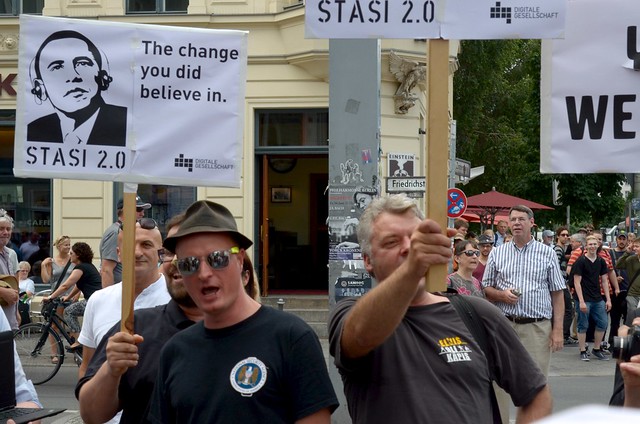[...]
And so, while Americans have been shocked and stirred to action by Mr. Snowden’s disclosures, Britain is resolutely unmoved. It’s not the old stiff upper lip of stoicism that you’re seeing, but a shrug of resignation and a habit of deference so deeply ingrained we hardly notice it.
Jonathan Freedland is a columnist for The Guardian.

Cabe Franklin London
I would just note, as a US citizen who has lived in the UK for 7 years (and in fact now lives just down the road from the Guardian HQ), that the way the two countries' governments - most specifically the police forces - exert authority are very different. Police in the UK don't carry guns and have to do much of their order-keeping work through conversation. The job of being a UK policeman or -woman attracts people who see their job as helping a community thrive.
In the US, of course, police carry guns and this threat of lethal force is part of any citizen interaction they have. Regrettably, it often seems to attract people who simply like to feel powerful and in charge. The fear and power dynamic inherent to this makes the average citizen's relationship to government authority more fraught.
The UK government may surveil more, but they have earned more trust from the UK public than perhaps the US government has. (The UK has had neither a Watergate or a Rodney King.) The IRA bombings of 30 years ago also taught a generation that there were bad guys and good guys and the government were the ones trying to keep them safe from terrorists.
So I would disagree that the attitude is one of deference - it strikes me more as a blend of pragmatism and trust.
Sam Allison Montreal, Canada
Mr. Freedland is repeating myth not fact when he suggests the Brits are more deferential than Americans towards government authority. In fact, Blair but not Bush was ousted because of lies about weapons of mass destruction. Cameron was recently defeated over his desire to possibly to wage war on Syria. In contrast, the USA has marched into many recent wars with little regard for public opinion.
A simple example of US deference to authority is the power of Presidents and Governors to pardon convicted criminals and overturn a jury decision.Neither the British nor the Canadian crown can overturn a decision by a jury. Ford's pardon of Nixon was accepted by a deferential citizenry. It is doubtful whether the Brits or the Canadian "subjects" would have deferred to such a situation involving a Prime Minister.
Attitudes to state power differ within the English speaking world and whether "subjects" of the Crown have fewer rights than "citizens" of the Great Republic is highly debatable. The ordinary "subject" lives a longer and healthier life than the "citizen" which partly reflects their civil liberty to do so.Medicare in Canada and the National Health System in Britain are regarded as increasing civil liberties by their "subjects" yet are regarded as decreasing civil liberties by many "citizens".
State spying is a great topic but a more sophisticated analysis of the different ways this is being done, accepted and opposed in democracies is obviously needed.
Ayn Rant Cleveland, GA
The British attitude toward governance is different from the US's because the British government is far less political and far more trustworthy.
In Britain, a professional civil service runs the country according to the laws passed by Parliament. Civil service is a well-paid, esteemed career, not a political appointment. Political partisanship by a civil servant, or interference with the civil service by an elected politician, is considered a scandal.
In the US, the civil service is run by appointed political hacks rather than career civil servants. Civil servants are not held in high esteem by the American public, and often serve as scapegoats for the neglect and failures of the elected politicians. For example, many Americans strongly support abolishing the IRS but seem unaware that Congress is to blame for the creation of the agency and the preposterous taxation rules that the agency attempts to enforce.
The notion that the citizens of the UK are more subservient to government than citizens of the US is nonsense! They simply have more respect and trust in their government to use coercive power fairly according to the exigencies of the day.
Having lived in both countries, I would say that the American federal and state governments are more intrusive on the daily life and personal freedom of citizens.
Americans complain a lot about politics and government. Brits complain about the economy or the weather, but seem unaware that they have or need a government.
Meredith New York
You may have an idealized vision of the US and the complications in the reactions here to Snowden.
Seems some Repubs want to prosecute Snowden as a weapon against Obama. Civil libertarians support Snowden and his revelations. There are shades of opinion.
It's the US that needs a new version of the Magna Carta, since power here is increasingly concentrated in the few top corporate plutocrats, who sway congress with thousands of lobbyists and campaign donations. They interpret our Constitution to their advantage.
The mass of citizens now has to be content with a small influence compared with that of the small circle of billionaire 'nobility' and their court of compliant politicians. My question to you--is there a British equivalent to the Koch Brothers organization, directing lawmaking at various levels of govt?
Sure we may have a credo of individualism, but that's used by our anti - govt power elite to keep citizens on their own and unprotected from drastic misfortune. Thus our govt was shutdown over a fight to prevent universal health insurance, while all British citizens have had that protection since 1948.
Our Supreme Court has blessed our big money elections. The Brits don't even allow privately paid political ads, costing us millions. The BBC is much better funded than our public media is, thus allowing for more non commercial media influence.
The Snowden affair will be distorted and masked by the powerful looking out for their interests.
ZAW Houston, TX
There's a huge difference between the surveillance done by municipalities and businesses through highly visible cameras and the clandestine wire-tapping done by Intelligence Agencies. The prior is overt - it relies as much on deterrence, as it does on information gathering and recording. We know we're being watched and we know why. The latter is covert - targets don't know they're being watched; the sole purpose is to watch them and gather information. It relies on dishonesty and we're far removed from any benefit it might bring.
I've come to appreciate the value of crime-cameras and other overt surveillance. It's growing in the US and that's a good thing. Clandestine surveillance by the NSA or a foreign government - that's a different story.
Uga Muga Miami
That complacency could be part of the British cultural psyche. Part of empire maintenance is a massive security and intelligence architecture. There's no such thing as having such an architecture, the mindset that goes with it and have it operate just outside home base. There's only one government at a time. When Britain evaporated as a several-centuries-duration World empire, including being the World empire for the one hundred years until the outcome of WWI, it retained the m.o. of a powerful state security apparatus. Probably the Brits taught the American neophytes "everything you ever wanted to know" about international and domestic intelligence operations. This may explain the long-lasting close cooperation with the US on such matters.
The difference is the British never pulled the wool over their own eyes about what was happening and why.
Michael Silverberg Efland, NC
My wife keeps reminding me that I have not lived in Britain (where I was born and educated) since 1973. Nevertheless...
1) When I moved here I was struck but how much more deferential Americans were towards authority than the British.
2) Americans do live under a sort of autocratic tyranny - a document written by long dead 18th century aristocrats. The majority of people living here today may want, for example, to control the availability of unimaginably destructive modern firearms. We are not allowed to because the words of men who knew nothing other than single shot muskets say we can't.
3) The parliamentary system keeps legislators closer to their constituents and less beholden to money.
4) A big difference between the governmental systems of the UK and the US is just how political the US is. Britain has a tradition of a professional civil service who are supposed to do their jobs, especially technical jobs, with political supervision only at the level of cabinet minister. In the US political appointments run deep into state and federal agencies which leads to a natural distrust of those agencies and by extension to government itself.
5) The article and many comments seem to conflate the issue of CCTV with invasions of privacy. CCTV is PUBLIC. instead of a bobby on the corner you have a camera. It is hard to get worked up about that - snooping into your private correspondence is different and the CCTV issue should not be allowed to distract us from that.
Peter C Ottawa, Canada
In Britain, unlike the United States, state sponsored surveillance has never been used for political purposes or to persecute due to politics. Britain has never had a Watergate or McCarthy and would not tolerate either.
Ian SF CA
The Brits have never had a Hoover or Nixon or Cheney or Tea Party, so haven't developed the gut assumption here that some day some ideologue in power will turn the state apparatus against them. To a Brit the state is your protector: to an American, more like a predator.



